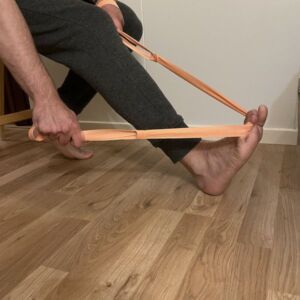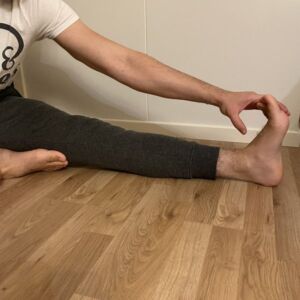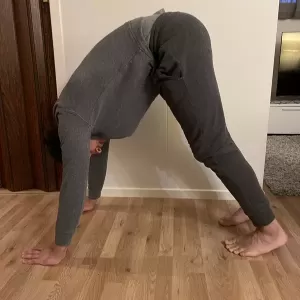Plantar Fascia Stretch: Effective Stretches To Relieve Tension in Plantar Fascia
The plantar fascia is both a strong and flexible band of tissue that connects your heel with your toes.
This fascia plays a crucial role in shock absorption when walking, running, or jumping so that you can move your feet smoothly and without pain.
Unfortunately, sometimes plantar fascia gets inflamed and painful so you can experience discomfort around the heel area or at the ball of your feet. Even standing can be challenging then.
Performing a few stretches for plantar fascia can definitely help you ease the pain, but keep in mind that you should always consult your healthcare provider when experiencing pain in your body.
Stretches For Plantar Fascia
Since plantar fascia is located at the sole of your feet, stretching this fascia will be done through the extension of your toes and dorsiflexion in your ankle. Here are some creative ways I find most effective to stretch plantar fascia.
1. Seated Plantar Fascia Stretch With Strap
Sit on a chair. Place a stretching strip below your toes and pull all of your toes up, towards your body. Add dorsal flexion of your ankle to increase the stretching of plantar fascia even more.
2. Floor Plantar Fascia Stretch
Sit on the floor and extend one leg. Grab your toes with your fingers and pull your toes toward your body.
Hold for 30s.
3. Reverse “V” Stretch for Plantar Fascia
Imitate the position from the picture above. You can do that by starting from the push-up position and lifting your hips up as much as you can.
When your heels lifts from the ground, stop.
Then, press down towards the floor with your heels.
Hold for 30s.
Why Stretching Plantar Fascia is Important
Regular stretching plantar fascia is helpful in reducing the chances of plantar fasciitis. This condition occurs often (among 10% of the US population). The core challenge of this condition is the overuse of plantar fascia and constant pressure on this tissue when walking, running etc.
If you struggle with plantar fasciitis, you should check out this exercise plan for plantar fasciitis I made. In there, you will find the most accurate informations about how to treat plantar fasciitis with exercising, self-massage and ankle mobilization techniques.
How to Locate Plantar Fascia?
Plantar fascia covers the sole of your feet, from heel to all of your toes. It’s a very thick band so that will make it difficult to palpate this fascia.
More stretching topics: 12 best stretching books, stretching tools for home workout, best tools for plantar fasciitis.



